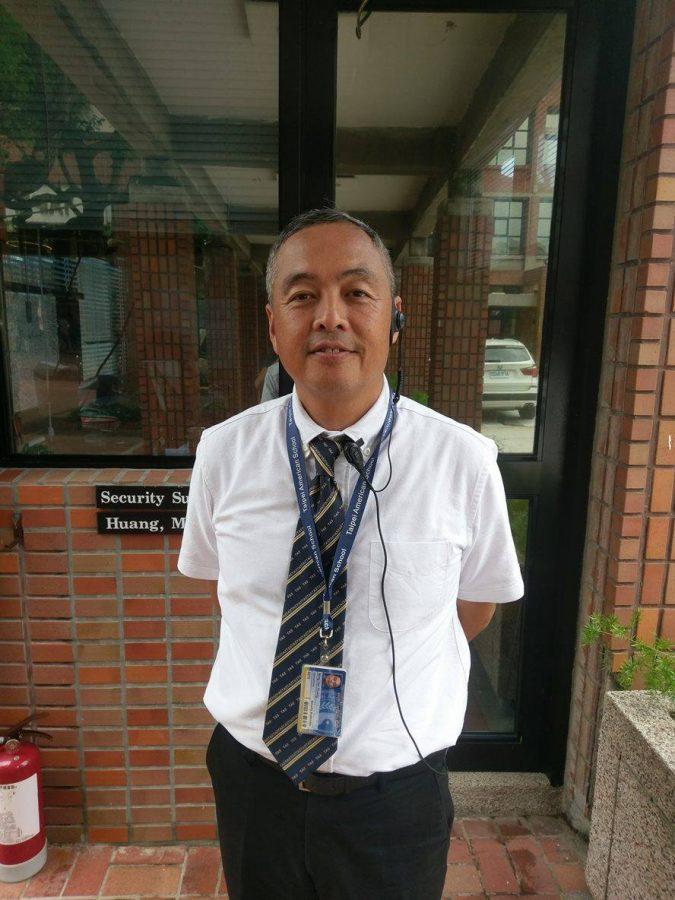The role that Taipei American School support staff play in the daily workings of the community is patently obvious; each and every day, guards, janitors, and maintenance hustle and bustle around campus from dawn till well past dusk. Yet, despite their constant interaction with and observation of TAS students, the vast majority of the support staff are local Taiwanese born and bred, giving them a special perspective on the distinctive blend of Eastern and Western cultures that is TAS. Surely, there are few more qualified to speak to TAS students than the support staff members, for from their unique point of view, they have accumulated a wealth of invaluable advice just waiting to be imparted.
The TAS student body, and international students in general, are often stereotyped as “rich kids” who have been spoiled by their parents and are disdainful of authority . However, Mr.Ming-Der Huang, TAS Security Supervisor, seems to disagree with this generalization. “TAS students are more joyful, but also more disciplined than local students,” he remarked. This was more than a little surprising, given that neat, saluting lines of students with identical haircuts is one of the first images that pops to mind when one hears “local school” and one of the last when one hears “TAS”. Besides, the characteristic of discipline is not generally associated with that of joy; an institution with strict rules would be expected to have miserable students more often than not. When asked to elaborate on this apparent non-sequitur, though, Mr. Huang explained that TAS discipline is “different from military discipline; [we] seem to understand the difference between right and wrong, and respect authority more.” His words must be music to the ears of TAS’ administration. Not only does the Security Supervisor commend the good behavior of TAS students, the type of “discipline” that he praises seems to transcend mere obedience. Instead of blindly following orders, Mr. Huang notices that students make decisions with a strong moral compass, reflecting the fruits of the countless hours school leadership has spent attempting to instill the values of Honesty, Respect, Responsibility, Kindness, and Courage in the collective mentality of students.
Nevertheless, though it seems that character education has led to upright moral and ethical standards among students, TAS students are by no means flawless paragons of virtue. One experienced custodian recounted the story of a senior prank some years ago, when the graduating class enlisted a group of the most ripped, gym-rat seniors to steal the Auguste Rodin-inspired Thinker statue from its usual place in the main TAS lobby, and drag it up a long flight of stairs into the atrium of the D-Block classroom building. Unfortunately, at the end of the day, the seniors were utterly exhausted by their hours of mischief, and found themselves unable to lift the statue. So, it was simply left by itself until later that night, a team of assiduous custodians removed the hefty Thinker from its incongruous position. For the student body attending class as usual the next day, it was as if the sculpture had overnight magically Disapparated back to its rightful place. Yet on the contrary, in this case and many others, the support staff put in an immense amount of work to ensure that any possible inconvenience to students is immediately and efficiently taken care of. In return, it is imperative that students help ease their workload by taking responsibility for our actions and cleaning up after ourselves, as is mandated in the TAS Honor Code.
It is evident that the TAS student body’s behavior towards the support staff, as with nearly everything in life, has its positive and negative aspects. However, the students with whom the staff members most enjoy interacting are those who warmly express appreciation for their dedication. One anonymous janitor noted how TAS students will spontaneously say “??”, or thank you, to her as she goes through her daily tasks. As I struggled to translate her subsequent Chinese description of how it felt to receive students’ gratitude, her colleague standing by rescued me, proudly spelling out “W-A-R-M!” Another custodian agreed wholeheartedly, saying in English “it…makes us feel very sweet-heart.” Mr. Huang, too, loves to be acknowledged by students. Along with his fellow guards, he arrives at school early to greet and watch over students as they arrive, and says cheerfully that “when TAS students say hi to me at the front gate, that makes me feel very happy to do my job.”
A simple word of thanks to those who maintain TAS’ first-class educational environment takes but a moment. However, that fleeting moment of recognition has an incredibly long-lasting impact, for a friendly conversation with a caring student, however brief, has the extraordinary ability to put a spring in a staff member’s step for the rest of their workday. Indeed, it is the satisfaction gleaned from these oft-overlooked expressions of appreciation that enables the supporting staff to make the difference they do in school life.
Before ending the interview, I asked Mr. Huang to leave us with a life lesson, some words of wisdom. He thought for a while, and then answered slowly in impeccable English, as he had throughout the interview: “…it’s not bad to be innocent, but on the outside you must be careful who you trust.”


![Members of Flourishing Love arrange bouquets together. [PHOTO COURTESY OF FLOURISHING LOVE]](https://blueandgoldonline.org/wp-content/uploads/2023/12/fl-1200x900.jpeg)
![Members of Formosa Charity reconstruct an old home. [PHOTO COURTESY OF CHAEWON B. (25)]](https://blueandgoldonline.org/wp-content/uploads/2023/12/bwb.jpeg)


![Catrina was waitlisted at Caltech but
intends to pursue Computer Engineering
at the University of Washington. [PHOTOS
COURTESY OF CATRINA Y.]](https://blueandgoldonline.org/wp-content/uploads/2023/05/Copy-of-IMG_4544-900x602.jpg)
![Honors Film 3 and 4 students set up the camera and microphone to get ready for an interview. [PHOTO COURTESY OF TAS FILM]](https://blueandgoldonline.org/wp-content/uploads/2023/05/DSC09834-900x507.jpg)